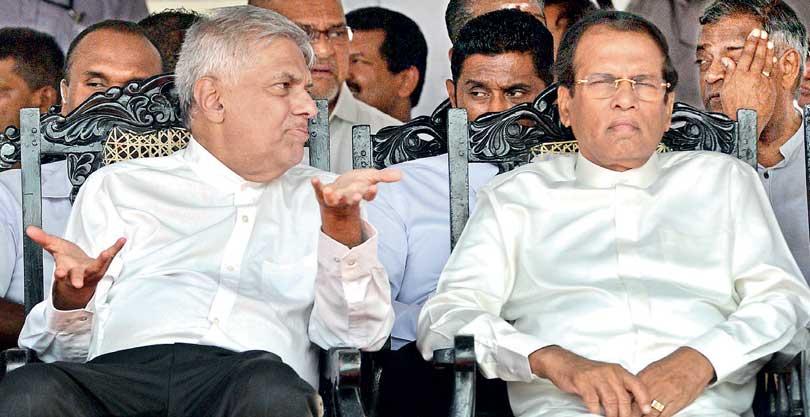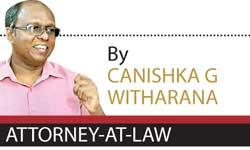Reply To:
Name - Reply Comment
Last Updated : 2024-04-25 09:32:00

The original 19A Bill was drafted with the intention to remove the powers of the President and transfer such powers to the Prime Minister
 On the 23rd the President said “The biggest mistake made by this Government was the 19th Amendment. It created instability”. He added that the President and the Prime Minister were pulling in different directions; the reason was the 19A.
On the 23rd the President said “The biggest mistake made by this Government was the 19th Amendment. It created instability”. He added that the President and the Prime Minister were pulling in different directions; the reason was the 19A.
Touching on the April 21st attacks, the President said that there was a serious lapse on the part of Defence Secretary and Inspector General of Police (IGP), who failed to inform him about the intelligence agency letter from a friendly foreign country, sent on April 4, warning about a possible attack. Both the President and the Prime Minister claim that they were not informed of the attacks. These statements made people wonder as to who was in control of the Government? Who is accountable to the people?
Constitutionally the Executive power of the People, including the defence of Sri Lanka, shall be exercised by the President (Art 4(a)). The President is the Head of the State, Head of the Executive and of the Government. He is also the Commander-in-Chief of the Armed Forces (Art.30).
The people entrust the Executive Power in the President with his election. Such power flows down through the machinery of the Government, which mainly comprises the Cabinet and the State administration. The Cabinet of Ministers is charged with the direction and control of the Government (Art 43(1)). Hence the Prime Minister and the Cabinet of Ministers get their powers from the President. Secretaries of the Ministries and all officials in the state administration function thereunder.
The People expect the President to fulfil duties entrusted to him by the constitution (Art 33(2)(1)(a)). Hence the President is obliged to assure a stable Government with a strong system of Defence. For that, the machinery of Government should function without any failure. In such a system, an “unbroken line of accountability and authority” (which generally flow on opposite directions) should run through the hierarchy of the Government and administration up to the President.
Prior to 19A, the President was at the apex of an ‘unbroken line of accountability and authority” in the system of Government. He had the authority to appoint and remove the Prime Minister, ministers and officials in high posts and secretaries. Accordingly the President had powers to form and decide on the structure and the composition of the Government. This structure was functional until the enactment of the 19A (impact of the 17th and 18th Amendments are not dealt with here). Though there was room for abuse of power and arbitrariness, that constitutional structure maintained a strongly organised system of national security, which led to the eradication of the extremist LTTE terrorists in 2009.
The 19A was an ad-hoc amendment, badly drafted without evaluating its consequences. The original 19A Bill was drafted with the intention to remove the powers of the President and transfer such powers to the Prime Minister. For example a comparison of two crucial clauses/articles in the previous constitution, 19A Bill and the final version of 19A would demonstrate the intentions of its makers;-
Confused division
The term “on the advice of the Prime Minister” made it compulsory for the President to act on the advice of the Prime Minister; a crafty circumvention the Supreme Court Determination to restore the previously intended position.
19A removed controlling “powers of Government” of the President to appoint and remove the ministers, the Prime-Minister and officials holding high-posts. The Amended Articles 43, 44 and 45 made the Prime Minister to be the real decision maker with regard to the implementation of powers of government. Finally it is the Prime Minister who actually decides the formation, structure and the composition of the Government. The actual powers to govern are no more with the President.
A confused division pertaining to the implementation of executive powers was created by 19A at the apex level. This necessarily disturbed the line of authority and accountability of the Ministers and the officials in the administration. Disastrous consequences of this system were not manifested until the termination of the UNP-SLFP/UPFA National Government. The National Government gave opportunity to both heads (PM and President) to act with common objectives. Unfortunately the stability of the government collapsed with the rift between the President and the Prime Minister followed by the withdrawal of the UPFA/SLFP from the National Government.
The new situation placed the officials below in the wilderness with regard to source of authority and point of accountability. This unstable government could not fulfil the legitimate expectations and aspirations of the people.
According to A.V. Dicey (a British jurist) Crown has right to dissolve the Parliament in extreme circumstances. He wrote “A dissolution is in its essence an appeal from the legal to the political sovereign. Dissolution is allowable, or necessary, whenever the wishes of the legislature are, or may fairly be presumed to be, different from the wishes of the nation” According to him the objective of dissolution is to “ascertain that will of parliament coincides with the will of the nation”.
Apparently acting in line with his argument, the President dissolved the government in October 2018. He published proclamation under Articles 33(2) (c), 62(2) and 70(1) (5) of the Constitution. The people were getting ready to elect a new (stable) government.
A confused division pertaining to the implementation of executive powers was created by 19A at the apex level
Several parties filed FR applications in the Supreme Court challenging the President’s decision. The Supreme Court quashed the Proclamation of dissolution declaring it null, void ab initio and has no force or effect in law (note; the arguments submitted and reasoning given in the judgment are not dealt with in this article).
Consequent to the SC judgement (13.12.2018), the parliament was re-summoned. But the government in the re-summoned parliament was not what was in power at the time of dissolution. The new (UNP) government was not strong or stable.
The new government continues to date in the midst of rift between the President and the Prime Minister. It (government) runs on a defective constitutional platform with no clear path of accountability and authority connecting the subordinate officials with the two competing executive heads on the top (PM and President). This constitutional defect seems to have disturbed the path along which the intelligence report to be carried up to the level of the President and the Prime Minister (decision makers). This vital report stagnated on tables of the officials without action.
Executive power of the people is exercised by the President (Art. 4(b)). However the President created by 19A cannot govern his own government. He cannot decide even on the IGP due to constitutional obstacles. In the absence of a clear line of accountability and authority connecting the source of executive power, the governance through the machinery of government has become inefficient and to a virtual standstill. This is a serious violation and deprivation of the sovereignty of the people.
Constitution before 19A
Article 43(2): “The President shall be a member of the Cabinet of Ministers and shall be the Head of the Cabinet of Ministers”;
Article 44(1): “The President shall, from time to time, in consultation with the Prime Minister, where he considers such consultation to be necessary-... (b) appoint from among the Members of Parliament, Ministers to be in charge of the Ministries so determined”.
Clause 11 of 19A Bill (originally intended amendment)
43(3) The Prime Minister shall be the head of the Cabinet of Ministers
43(1) The Prime Minister shall determine the number of Ministers of the Cabinet of Ministers, and the Ministries and the assignment of subjects and functions to such Ministers.
The Supreme Court held such conversion as unconstitutional;
“In the absence of any delegated authority from the President if the Prime Minister seeks to exercise the powers referred to in the aforesaid Clause, then the Prime Minister would be exercising such powers which are reposed by the People to be exercised by the Executive, namely, the President and not by the Prime Minister. In reality, the Executive power would be exercised by the Prime Minister from below and does not in fact constitute a power coming from the above, from the President...If the Executive power of the People can be renounced in this manner, serious questions regarding the proper administration of the country could arise...”
Consequent to the Supreme Court Determination the sections were changed in the final version of 19A as follows;
42(3) The President shall be a member of the Cabinet of Ministers and shall be the Head of the Cabinet of Ministers (the same clause as before)
43(2) The President shall, on the advice of Prime Minister, appoint from among Members of Parliament, Minsters, to be in charge of the Ministries so determined. (NOT the same as before).

Add comment
Comments will be edited (grammar, spelling and slang) and authorized at the discretion of Daily Mirror online. The website also has the right not to publish selected comments.
Reply To:
Name - Reply Comment
US authorities are currently reviewing the manifest of every cargo aboard MV
On March 26, a couple arriving from Thailand was arrested with 88 live animal
According to villagers from Naula-Moragolla out of 105 families 80 can afford
Is the situation in Sri Lanka so grim that locals harbour hope that they coul